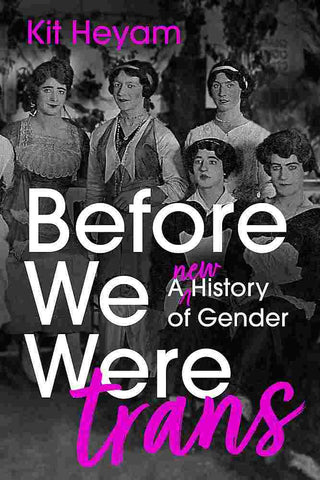Before We Were Trans : A New History of Gender
- Unit price
- / per
-
Author:HEYAM Kit
-
ISBN:9781529377750
-
Publication Date:June 2022
-
Edition:1
-
Pages:320
-
Binding:Paperback
-
Publisher:Te Herenga Waka University Press
-
Country of Publication:


A Back Order button means that we don’t have the book in stock at our store. It may already be on order – or we can order it for you from a publisher or distributor at no additional cost.
As we source items from around the globe, a back-order can take anywhere from 5 days to several weeks to arrive, depending on the title.
To check how long this might take, you’re welcome to contact us and we can provide an ETA or any other information you need. We recommend checking the timeframe before committing to an online order.
Before We Were Trans : A New History of Gender
- Unit price
- / per
-
Author:HEYAM Kit
-
ISBN:9781529377750
-
Publication Date:June 2022
-
Edition:1
-
Pages:320
-
Binding:Paperback
-
Publisher:Te Herenga Waka University Press
-
Country of Publication:
Description
Across the world today, people of all ages are doing fascinating, creative, messy things with gender. These people have a rich history - but one that is often left behind by narratives of trans lives that focus on people with stable, binary, uncomplicated gender identities. As a result, these stories tend to be recent, binary, stereotyped, medicalised and white.
Before We Were Trans is a new and different story of gender, that seeks not to be comprehensive or definitive, but - by blending culture, feminism and politics - to widen the scope of what we think of as trans history by telling the stories of people across the globe whose experience of gender has been transgressive, or not characterised by stability or binary categories.
Transporting us from Renaissance Venice to seventeenth-century Angola, from Edo Japan to North America, the stories this book tells leave questions and resist conclusions. They are fraught with ambiguity, and defy modern Western terminology and categories - not least the category of 'trans' itself. But telling them provides a history that reflects the richness of modern trans reality more closely than any previously written.
Adding product to your cart
You may also like
A Back Order button means that we don’t have the book in stock at our store. It may already be on order – or we can order it for you from a publisher or distributor at no additional cost.
As we source items from around the globe, a back-order can take anywhere from 5 days to several weeks to arrive, depending on the title.
To check how long this might take, you’re welcome to contact us and we can provide an ETA or any other information you need. We recommend checking the timeframe before committing to an online order.
You may also like
You may also like
-
Across the world today, people of all ages are doing fascinating, creative, messy things with gender. These people have a rich history - but one that is often left behind by narratives of trans lives that focus on people with stable, binary, uncomplicated gender identities. As a result, these stories tend to be recent, binary, stereotyped, medicalised and white.
Before We Were Trans is a new and different story of gender, that seeks not to be comprehensive or definitive, but - by blending culture, feminism and politics - to widen the scope of what we think of as trans history by telling the stories of people across the globe whose experience of gender has been transgressive, or not characterised by stability or binary categories.
Transporting us from Renaissance Venice to seventeenth-century Angola, from Edo Japan to North America, the stories this book tells leave questions and resist conclusions. They are fraught with ambiguity, and defy modern Western terminology and categories - not least the category of 'trans' itself. But telling them provides a history that reflects the richness of modern trans reality more closely than any previously written.
-
-
Author: HEYAM KitISBN: 9781529377750Publication Date: June 2022Edition: 1Pages: 320Binding: PaperbackPublisher: Te Herenga Waka University PressCountry of Publication:
Across the world today, people of all ages are doing fascinating, creative, messy things with gender. These people have a rich history - but one that is often left behind by narratives of trans lives that focus on people with stable, binary, uncomplicated gender identities. As a result, these stories tend to be recent, binary, stereotyped, medicalised and white.
Before We Were Trans is a new and different story of gender, that seeks not to be comprehensive or definitive, but - by blending culture, feminism and politics - to widen the scope of what we think of as trans history by telling the stories of people across the globe whose experience of gender has been transgressive, or not characterised by stability or binary categories.
Transporting us from Renaissance Venice to seventeenth-century Angola, from Edo Japan to North America, the stories this book tells leave questions and resist conclusions. They are fraught with ambiguity, and defy modern Western terminology and categories - not least the category of 'trans' itself. But telling them provides a history that reflects the richness of modern trans reality more closely than any previously written.
-
Author: HEYAM KitISBN: 9781529377750Publication Date: June 2022Edition: 1Pages: 320Binding: PaperbackPublisher: Te Herenga Waka University PressCountry of Publication:
-



